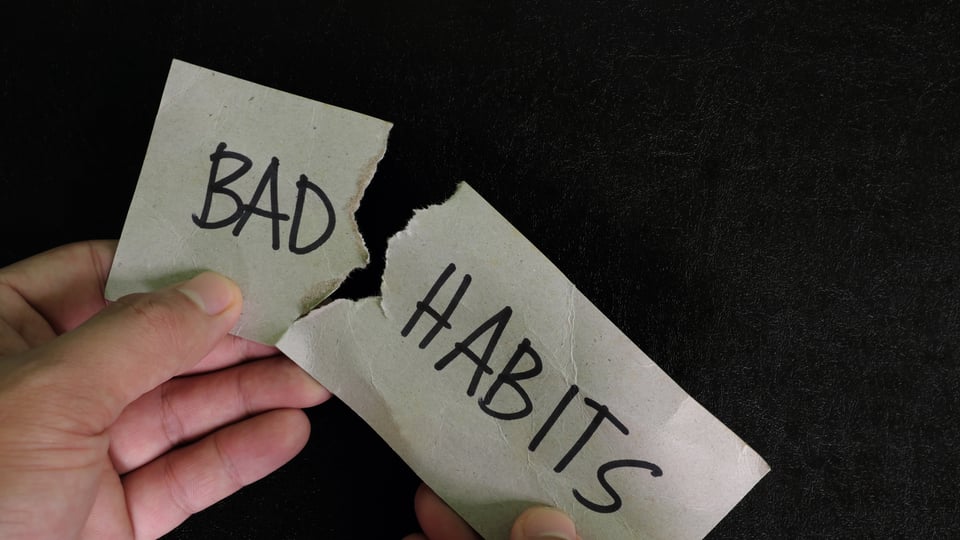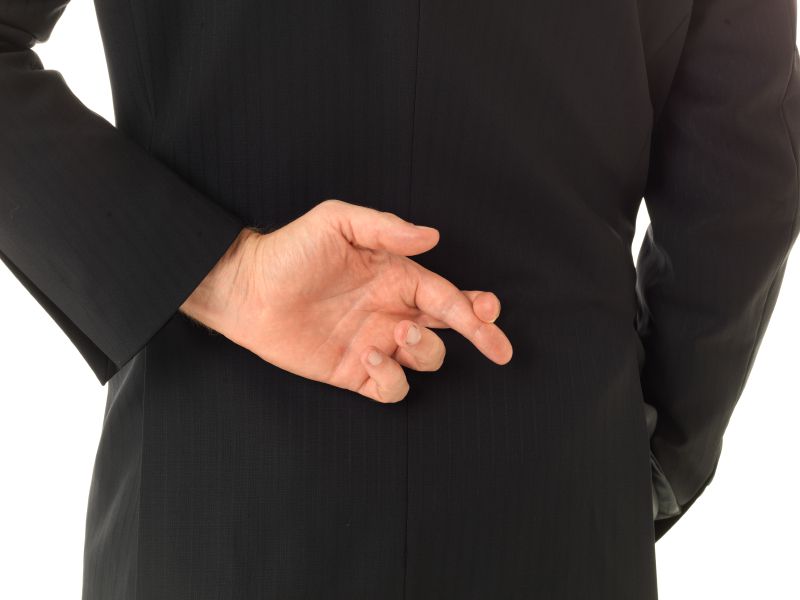10 Bad Habits You Need to Break (With a Twist)
Our habits, what we do and say on a regular basis, define us to others—especially when those habits are bad. How can we change our bad habits at the roots?

Do you have a bad habit that you want to break?
The Internet is full of lists about habits: the “worst” habits, the bad habits people developed during the lockdown, why we develop bad habits and so forth. It’s like an “all-you-can-eat buffet” (which can be another bad habit to break, by the way).
Our bad habits run the gamut from mild annoyances (spending too much time on social media) to the absurd (chewing too loudly) and from self-indulgence (being lazy or watching too much television) to inappropriate language (swearing).
10 bad habits and how you can break them
So here, with a twist that should become evident to many Christians, are 10 bad habits and how to break them.
Bad Habit 1: Wanting what others have, but not what you have.
Associated bad habits: Endlessly scrolling through social media longing for all that artificially curated happiness. Sometimes it’s called “keeping up with the Joneses” or the delusion that “the grass is always greener on the other side.”
How to kick it: The best way to overcome covetousness is by actively being thankful for what we already have (1 Thessalonians 5:18). It also helps to develop a proper perspective on this physical life—how it is not going to last very long in the grand scheme of things. While we stare at others’ lives on social media, searching for that greener grass, we may be missing out on the truly fulfilling things in life that we are taking for granted.
Bad Habit 2: Lying to yourself and to others.
Lying might seemingly give us some advantages temporarily, but it doesn’t last. Eventually, our lies will catch up to us. 
How to kick it: The best way to be free from the habit of lying is to embrace the truth (John 8:32). Remember, lying to ourselves and others only leads us away from true happiness and further toward an overall weakening of objective reality. Lying gives us plenty of fake happiness and might even seemingly give us some advantages temporarily, but it doesn’t last. Eventually, our lies will catch up to us.
Bad Habit 3: Taking stuff that isn’t yours.
Associated bad habits: We don’t have to be professional thieves to be guilty of stealing. More accepted and subtle forms of stealing include fudging time sheets, cheating on our taxes, excessively wasting time while at work or borrowing things from others and then conveniently never returning them.
How to kick it: To overcome subtle stealing, put the Golden Rule to the test (Luke 6:31). Consider deeply how you would feel if others were taking from you in the same way. Would we really want others to cheat us out of our money, slack off on work we have contracted them to do, or never return items they borrowed from us? It’s better to get a handle on these perspectives and questions in our minds before we get into the habit of stealing and then eventually reap what we have sown (Galatians 6:7).
Bad Habit 4: Sexualizing everything you possibly can.
Associated bad habits: Sexualizing includes ogling the opposite sex, indulging in pornography, having extramarital affairs, wasting time with raunchy comedies and TV shows, losing connection with your spouse or constantly integrating sexually related jokes and comments into your conversations.
How to kick it: Remind yourself that God is love (1 John 4:8). His love is pure. Our loving God wants happiness for His children and intends that they enjoy fulfilling sex within a committed marriage (Genesis 2:23-24). But any kind of sex outside of that exclusive relationship is destructive, no matter how much our modern culture tries to portray it as “normal.” Our society is continually eroding the connection between true committed love and sex. Fight this by fleeing all forms of sexual immorality, a habit that specifically attacks our own bodies (1 Corinthians 6:18).
Bad Habit 5: Romanticizing hate and violence.
Associated bad habits: This can manifest itself when we waste inordinate amounts of time watching ultra-violent TV shows and movies, waste time playing violent and all-too-realistic video games or give ourselves over completely to political anger (often let out in angry online rants).
Hatred and anger in the heart is where the spirit of murder begins. 
How to kick it: Remember that Jesus taught that murder starts in the heart long before it’s acted upon (Matthew 5:21-22). It would be wise to ask why modern media is so often celebrating stories of bloody revenge with vivid, violent details, and why so many take a perverse joy in watching people rip someone else apart—either physically or verbally. It is not good for us and does not promote the sanctity of life.
Bad Habit 6: Habitual disrespect to your parents and family.
Associated bad habits: Losing touch with our relatives, having angry shouting matches at Thanksgiving and reunions and using our parents or elders as therapeutic punching bags rather than advisers.
How to kick it: Practice showing humility and honor toward your parents as the right thing to do (Ephesians 6:1)—respectfully listening to them and eventually caring for them as they get older. No parents are perfect, but they should be honored and respected. (Of course, if our parents and family are abusive, we can show respect from a distance.) So many bad habits connected to family drama and dysfunction can begin to heal if someone acts humbly (1 Peter 5:5), especially youth who show honor by submitting themselves to their parents and elders.
Bad Habit 7: Pretending you can make things holy that God didn’t.
Associated bad habits: Dropping piles of cash to celebrate holidays that supposedly have Christian themes, but in reality are absent from the Bible and have pagan roots. These celebrations include Christmas, Easter and Sunday worship. Some other bad habits associated with the days include lying to children (about Santa Claus, the Easter bunny, etc.) and creating cognitive dissonance when the practices of man-made traditions conflict with what is actually taught in the Bible.
How to kick it: Observe the weekly Sabbath and the annual festivals God designated as holy (Leviticus 23). Remember, calling something holy when God never designated it holy is a shaky foundation for our religious beliefs. The many traditions associated with these popular holidays may be fun, but they aren’t holy or sanctioned by God.
Bad Habit 8: Using God’s name flippantly and casually.
Associated bad habits: Swearing, cursing, cussing, being a hypocrite in how we act or speak, and not living up to what we say we are or want to be.
How to kick it: Say what you mean and do what you say. We should leave God out of our statements and proclamations (Matthew 5:33-37)—unless we are praising Him. So often, God gets dragged into meaningless conversations as a punchline or a silly refrain that lazy people use when they can’t think of better vocabulary—using “God” (or euphemisms for God’s name) over and over again with no meaning or even using it as a condemnation. Is God showing up in our speech in a positive way or in a way that shows no respect for Him at all? Also, if we say we believe in God, we should ask ourselves, do our actions and our speech demonstrate that belief?
Bad Habit 9: Envisioning God as something that He clearly isn’t.
Associated bad habits: Spending money on false representations of God and thinking that something we can physically touch is more important than spiritual fulfillment.
How to kick it: Keep yourself from the many idols that permeate this world (1 John 5:21), especially the ones that appear to be stuffing the God of all creation into a physical box. These kinds of portrayals can include cross necklaces (in essence, worshipping the instrument that killed Christ) and paintings of Jesus Christ that depict Him as a lily-white European (not a Middle Eastern Jewish man who spent hours outside), as overly effeminate (not a strong and masculine carpenter) and as long-haired (which the Bible states is shameful). These false images show no respect and are actually disrespectful to God.
Be mindful of other idols as well—for instance, the human body is lovely, but it should not be worshipped (through pornography or obsession with physical health). Likewise, God’s creation is beautiful and should be well-maintained and cared for, but not worshipped (often accompanied by self-righteous condemnation of those who aren’t “green” enough).
Bad Habit 10: Treating things like they are God, when they aren’t.
Associated bad habits: Addiction to alcohol, sex, technology, gambling, pornography, junk food, cigarettes, drugs, social media, trendy spiritualism and so much more.
How to kick it: Since loving God with all our heart, mind, soul and strength (Matthew 22:34-40) is the first great commandment, everything else should take a back seat. Imagine if the time and energy we put into various cravings and addictions were redirected into loving others and using our gifts and energy to make other people’s lives better? If we put our energy into building up our relationships with God and with other people, we wouldn’t have time for a lot of the bad habits that can destroy our health, relationships and connection with our Creator.
The twist—the real source of all bad habits
Did you catch the twist?
If you think the above 10 sound familiar, you’re right! The above list includes the eight bad habits God tells us to avoid and the neglect of the two good habits He tells us to practice—otherwise known as the 10 Commandments. (We reversed the order to make it a little less obvious.)
Refusal to adhere to these 10 basic guidelines of life is the source of nearly every bad habit we develop.
If we want to kick bad habits out of our lives, the best place to start is by sincerely studying and applying the letter and spirit of each of God’s 10 Commandments.
Date Posted: February 13, 2023



